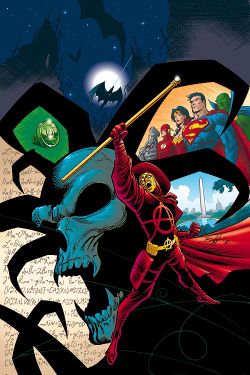Anarky
| Anarky | |
|---|---|

Promotional art for
Anarky vol. 2, No. 1 (May 1999)
by Norm Breyfogle
|
|
| Publication information | |
| Publisher | DC Comics |
| First appearance | Detective Comics No. 608 (Nov. 1989) |
| Created by | Alan Grant Norm Breyfogle |
| In-story information | |
| Alter ego | Lonnie Machin |
| Partnerships | Legs |
| Notable aliases | Moneyspider |
| Abilities |
|
|
|
| Images | |
|---|---|
|
|
|
|
|
|
| Video | |
|
|
|
|
Anarky is a fictional character, appearing in comic books published by DC Comics. Co-created by Alan Grant and Norm Breyfogle, he first appeared in Detective Comics No. 608 (November 1989), as an adversary of Batman. Introduced as Lonnie Machin, a child prodigy with knowledge of radical philosophy and driven to overthrow governments to improve social conditions, stories revolving around Anarky often focus on political and philosophical themes. The character, who is named after the philosophy of anarchism, primarily espouses anti-statism; however, multiple social issues have been addressed through the character, including environmentalism, antimilitarism, economic inequality, and political corruption. Inspired by multiple sources, early stories featuring the character often included homages to political and philosophical books, and referenced anarchist philosophers and theorists. The inspiration for the creation of the character and its early development was based in Grant's personal interest in anti-authoritarian philosophy and politics. However, when Grant himself transitioned to the philosophy of Neo-Tech, developed by Frank R. Wallace, he shifted the focus of Anarky from a vehicle for socialist and populist philosophy, to rationalist, atheist, and free market thinking.
Originally intended to only be used in the debut story in which he appeared, Grant decided to continue using Anarky as a sporadically recurring character throughout the early 1990s, following positive reception by readers and Dennis O'Neil. The character experienced a brief surge in media exposure during the late 1990s when Norm Breyfogle convinced Grant to produce a limited series based on the character. The 1997 spin-off series, Anarky, was received with positive reviews and sales, and later declared by Grant to be among his "career highlights".Batman: Anarky, a trade paperback collection of stories featuring the character, soon followed. This popular acclaim culminated, however, in a financially and critically unsuccessful ongoing solo series. The 1999 Anarky series, in which even Grant has expressed his distaste, was quickly canceled after eight issues.
...
Wikipedia
